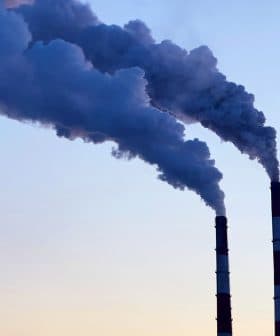Rising Carbon Dioxide Levels Will Reduce Nutritional Value of Crops
The effects of carbon dioxide put populations at risk of losing the available dietary protein in staple crops, compounding the challenges of poverty worldwide.
Harvard University research warns that rising carbon dioxide levels could significantly reduce the nutritional content of staple crops, potentially putting 150 million people at risk of losing more than five percent of their dietary protein by 2050. The study emphasizes the need for countries to actively monitor their populations’ nutritional sufficiency and to curb human-caused CO2 emissions to address this looming issue.
New research by Harvard University warns that rising carbon dioxide levels that contribute to global warming could drastically reduce the nutritional content of staple crops.
Researchers from Harvard’s T.H. Chan School of Public Health who conducted the study have concluded that if carbon dioxide levels continue to rise, the nutritional value of crops like wheat, rice, barley and potatoes will be reduced. This would put the populations of 18 countries around the world at risk of losing more than five percent of the dietary protein available to them by 2050.
This study highlights the need for countries that are most at risk to actively monitor their populations’ nutritional sufficiency, and, more fundamentally, the need for countries to curb human-caused CO2 emissions.
In concrete numbers, this amounts to 150 million people. The researchers arrived at this figure by studying the results of experiments conducted on crops by exposing them to high carbon dioxide levels and examining global dietary information, demographical data and figures measuring income inequality.
The study, published in Environmental Health Perspectives, revealed that when exposed to high levels of carbon dioxide, the protein content of rice decreased by 7.6 percent, 7.8 percent for wheat, 14.1 percent for barley and by 6.4 percent for potatoes. This also presents a risk of decline in the mineral content of these foods, like zinc, iron and selenium, all of which are essential for human health.
According to the study, 76 percent of the world’s population gets its protein from plants. The regions highlighted as the most vulnerable include Sub-Saharan Africa where protein deficiency is already a dilemma and South Asian countries like India where rice and wheat are staples and the main protein source.
In India, 5.3 percent of the protein content of crops could be lost, affecting 53 million people.
In a Harvard University press release, Samuel Myers, senior research scientist at the Department of Environmental Health stressed that action needs to be taken: “This study highlights the need for countries that are most at risk to actively monitor their populations’ nutritional sufficiency, and, more fundamentally, the need for countries to curb human-caused CO2 emissions,” he said.
“Strategies to maintain adequate diets need to focus on the most vulnerable countries and populations, and thought must be given to reducing vulnerability to nutrient deficiencies through supporting more diverse and nutritious diets, enriching the nutritional content of staple crops, and breeding crops less sensitive to these CO2 effects.”
Carbon dioxide is one of the heat-trapping greenhouse gases that contribute to climate change. This was the first study to quantify the impacts of rising carbon dioxide levels as a result global warming on the protein content of staple crops.
The researchers point out that adding more fertilizer to crops does not mitigate the negative effects of carbon dioxide on plant protein, with fertilizer production and utilization actually being a contributor to greenhouse gas emissions.
Replacing plant protein with animal protein is not presented as a solution either because of the resource-intensive nature of livestock farming. Instead, more resilient crops like legumes could be an alternative, as well as measures addressing more equitable food distribution and poverty reduction.









